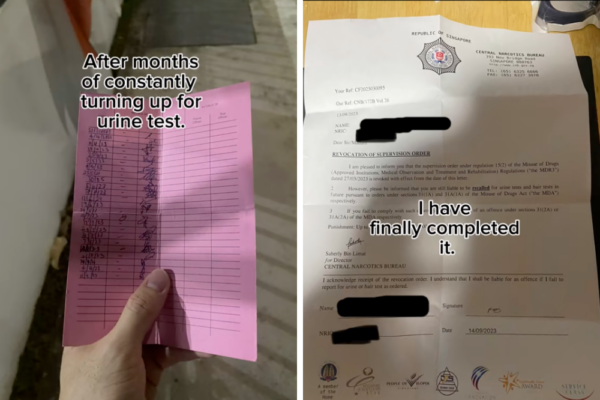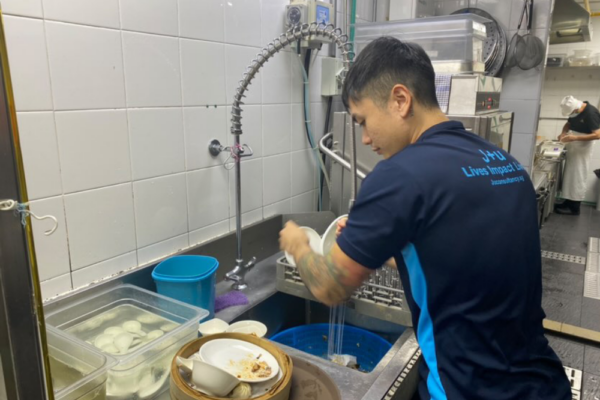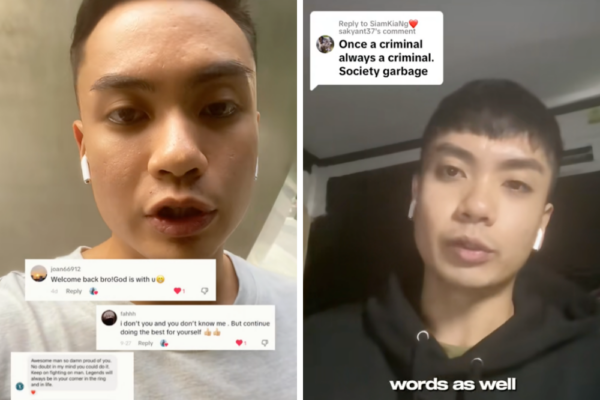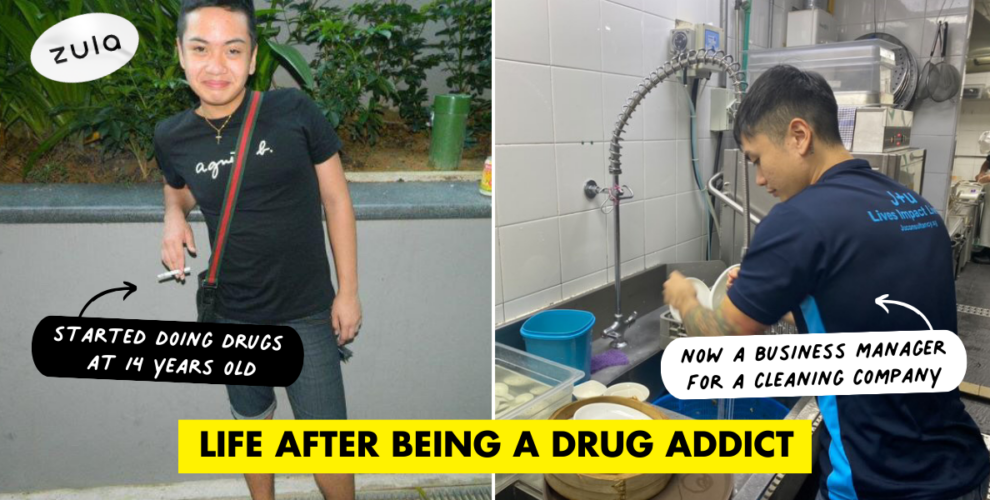I Was A Drug Addict At 14 Years Old
Growing up in Singapore, many of us remember filling up the “anti-drug ambassador” booklet, earning points and eventually receiving a green ribbon to proudly pin onto our school bags. While these activities were fun, they also played an important role in educating us that drugs are a huge no-no.
Though we were taught to “just say no”, the reality isn’t always as easy as it seems. For Ryan, who was first introduced to drugs when he was just 14, his friends’ persistence and his own curiosity managed to get the better of him.
Here’s what Ryan’s journey was like, taking drugs as a young teen, flitting in and out of prison, and how he eventually managed to start afresh and re-enter society.
Contents
Trying drugs for the first time
 Ryan when he was 15 and frequently using drugs
Ryan when he was 15 and frequently using drugs
Ryan described himself during his teenaged years as “mixing around with the wrong crowd”. He grew up closely with his neighbours back then, and was the youngest out of all of them, being 14, while the rest were 18.
“I knew them since I was in primary school and we were pretty close for a long time. One day, they introduced me to the drug ice, aka crystal meth. I was very curious as a child, and seeing all my older peers get into it made me want to try.”
Ryan admitted that he didn’t fully understand the repercussions of taking drugs at that point of time — he simply took them for the thrill.
Struggling with side effects
 Ryan now, 27 years old and sober
Ryan now, 27 years old and sober
Most of us have the impression that taking drugs will turn you into a mindless zombie. But what is it really like? Sharing with us his firsthand experience, Ryan recounts the side effects to be “very drastic”.
“I didn’t have a clear mind and did a lot of weird things under the influence. I experienced a lack of sleep and loss of appetite. When I was using drugs heavily, I always justified it to myself by saying that I’m not addicted to it, but rather, I was just bored. But I actually went downhill from there.”
Ryan also found himself telling a lot of lies. Since drugs were expensive, he often asked his friends and family for money to buy food, when he was in fact, spending them all on drugs.
Mood swings were common. He felt agitated easily, resulting in violent behaviour at times. “One time, I suddenly felt very depressed. Taking drugs amplified that feeling, and I even entertained thoughts of suicide.”
“I think even my family members were able to tell the difference in my behaviour, since I was constantly locked up in my room and looked increasingly haggard as the days went by. They had their suspicions, but they couldn’t put a finger on what I was doing.”
Going in and out of prison
 The removal of Ryan’s electronic tag and revocation of urine supervision
The removal of Ryan’s electronic tag and revocation of urine supervision
Source
By the time Ryan was 17, he was already heavily addicted to drugs. But with this age also came an unavoidable rite of passage for every Singaporean male — National Service.
“When I enlisted, I thought to myself — I want to change. So I surrendered myself to the SAF officers and confessed to having a history of drug consumption. I underwent a number of drug protocols, such as urine tests.”
Ryan also held something like 11 different criminal charges at that point, ranging from robbery and impersonation to rioting and disorderly behaviour. Quite a number of these were repeated charges, committed with the same group of friends who introduced him to drugs.
“At a young age, I did feel a bit of remorse. I felt like I was wasting my time, yet there wasn’t really a drive to change. I still remember the phone call that I was allowed to make to my grandma, who I was very close to. When I told her about my prison sentence, she broke down 3 times.
I wanted a lighter sentence. But deep down, I knew the crimes I committed were pretty serious. Towards the end of my sentence, I came out with a positive mindset and thought I could change for real. But I kept going back to my old friends and their delinquent lifestyles.”
Ryan was constantly in and out of penitentiary institutions. He entered a boys’ home when he was 14, a reformative training centre at 19, detention barracks at 23 and spent another short stint in prison at 24.
He was sentenced again at 25, and was released from prison for the final time earlier this year.
Also read:
I Became An OnlyFans Creator After Working As A Teacher For 8 Years & It Improved My Mental Health
Final wake up call
 Ryan with his friend who helped him, and his friend’s mother who is like a mother to him too
Ryan with his friend who helped him, and his friend’s mother who is like a mother to him too
The first thing Ryan did when he came out of prison was cut off all ties with his old friends. Though they’d been friends for a long time, Ryan learned that sometimes, you just have to make the right decisions to put yourself first, no matter how difficult it may be.
Ryan shared about an important turning point in his life, which he also refers to as his “darkest moment”.
“One day, I was depressed and left with only $50 in my pocket. I was contemplating — should I use my last $50 to buy drugs, or should I use it to get food to eat?”
Unfortunately, this isn’t the clichéd life lesson we’re looking for. Ryan chose to spend his money on drugs, which only lasted him several hours. At this point, he was left with absolutely nothing.
“When I was done, I received a phone call from a good friend of mine. I ignored it, but he kept insistently calling me. I was so annoyed that I ended up picking up the phone call, and he asked me out for lunch. I told him I didn’t have any money, but he brushed it off and took me out to eat.”
After that, Ryan’s friend introduced him to other, new friends who would bring more positive influences into his life, and who firmly told him to stop his drug habit for good.
While Ryan’s friend was one huge factor that induced this new change, Ryan himself also felt that he didn’t want to let his family down anymore. And the final reason? Himself. “I felt so disgusted with myself. I have so much potential in life, so why was I wasting it all away? At this age, if I still don’t want to change, when will I ever?”
Pursuing new goals
 Ryan boxing with his coach
Ryan boxing with his coach
Ryan worked for a moving company just before he entered prison for the last time. In such a physically tiring environment, he struggled a lot as his body was weakened from the long term drug abuse.
“I needed cash, but it was so difficult. I sat on the back of a lorry and teared up, asking myself, why did I choose this?”
When Ryan was in prison, he started working out and realised that he really enjoyed it. It was then he decided — why not use fitness as a coping mechanism to stay away from drugs? So he started working out more, incorporating gymming and boxing into his daily routine.
After he got out of prison, Ryan had to wear an electronic tag on his ankle for six months. He felt judged every time he stepped out in public, and chose to wear long pants as often as he could.
“Sometimes, people come right up to me and ask, ‘What’s that on your leg?’ So instead of taking it negatively, I took it as an opportunity to share that I used to take drugs, and these are my consequences.”
While some people were open to listening to his story, others were sceptical. “There was this lady who asked me outright, ‘Are you on drugs?’. I told her that I used to be. Then she disgustedly asked, ‘So many things to do, why do drugs?’”.
But Ryan understands that these comments are based on others’ prejudice against him, an ex-convict. Most of the time, people didn’t bother to ask him about the tag.
 Ryan when he first started working after getting out of prison
Ryan when he first started working after getting out of prison
The first job Ryan picked up after leaving prison was at a cleaning company, which is also a part of his family’s business. He started from the most basic tasks, such as washing the dishes, to get to know how the company operates, tirelessly working 12-hour shifts every day.
“Eventually, I stepped up as a business development manager and started hiring ex-convicts. We’re still hiring them, even now. Personally, I know how hard it is for ex-convicts to get a job. Dishwashing isn’t a glamorous job, but what’s more important is the fact that it’s a stepping stone for them to find their way back into society.
I didn’t just enter this company and immediately start as a manager. I started out washing dishes, staying late and running last-minute errands. I always tell the ex-convicts: If you can’t hold a basic job for a few months, then how are you going to progress in life?”
Advice to others
 Replying to TikTok comments about his journey
Replying to TikTok comments about his journey
Source, source
The hardest part about returning back to society? Regaining everyone’s trust. Ryan was determined to prove that he had turned over a new leaf, going for one-to-one counselling sessions to open up about addiction and clearing his weekly urine tests.
Today, he’s officially been sober for over seven months since being released — longer if you count his time in prison.
Hoping to shed some light on youths at risk, Ryan shared his journey in a now viral TikTok video that has garnered nearly 300,000 views. “As someone who was a youth at risk myself, I feel that a lot of them are very reckless and want to do things without facing the repercussions. I want to use my story to actually share how adverse the effects can be.”
Ryan didn’t expect his TikTok to blow up, with many leaving encouraging comments on the video. This motivates him to continue sharing more about his journey.
“Since this is something that I can tap on to inspire others, why not? There were actually people who left their phone numbers in my DMs, letting me know that I can drop them a call if I ever need someone to talk to. I think those were the people who impacted me the most, simply because they’re so open, even though we are strangers.”
But of course, there are always two sides to every story. Ryan opened up that he also received an onslaught of negative comments, with one of them harshly telling him, “Once a criminal, always a criminal. Society garbage.”
Ryan takes these comments in his stride. “We cannot change others’ opinions of us, but we shouldn’t let them affect our mindset. I don’t have to prove myself to the haters. Rather, I focus on the sincere comments and spread encouragement along the way.”
 Ryan with his bible study group
Ryan with his bible study group
As of October 2023, Ryan has had his supervision order revoked — meaning he’s basically free. But Ryan doesn’t see this as a sign to relax and let go.
“For recovering addicts like myself, we should always be on our guard. We have to make sure that we don’t go back to doing the things that we used to do.”
Ryan has been working hard since re-entering society, picking up sports and going back to church to seek peace. Now, he thinks his biggest achievement is finally being able to rebuild his relationship with his loved ones.
When asked if he regrets his past, Ryan describes the experience as a “double-edged sword”.
“Thinking back about all the years I wasted, I felt that there were a lot of things I could have achieved. But we can’t change our past. In a way, it made me who I am today. So if it wasn’t for the past mistakes that I’ve made, I wouldn’t have matured and become more open about these new and positive things in my life.”
And to ex-convicts in Singapore out there, Ryan wants to assure you that you’re not alone in your struggles. “Believe in yourself. Back then, I had low confidence and sought validation from my friends, even if they weren’t the right company for me. But it’s important to love yourself and have goals to work towards. Don’t take things for granted. This is something I had to learn the hard way.”
Ryan’s Journey As An Ex-Drug Addict Reminds Us That Everyone Deserves A Chance To Change
Some might think that at 27 years old, it’s too late for Ryan to restart his life. But Ryan disagrees — “It’s not so much about proving to others that I can change. It’s about proving to myself that I can achieve something with my life now.”
And to those who may still be suspicious of ex-convicts returning to society, Ryan hopes they can learn to be kinder.
“Sometimes, this person may be on their very last straw. They are looking for a support system to get them through hard times. For me, simple things that my friends do such as checking up on me, having meals with me and just believing in me were important things that helped in the long run.”
All images courtesy of Ryan.
Also read:
Singapore Athlete Shanti Pereira Shares How She Deals With Pressure & Breaking Records








